It feels like your subjects talk about you Kupa ... Or Swineherd. Or a Soft Sword. Not all rulers were recorded in the annals as Beautiful, Great or Wise. Here are ten particularly embarrassing nicknames.
In the pages of history they appear along with the names of leaders, kings and tsars. Sometimes proud - showing the qualities of character and beauty, sometimes ridiculous, embarrassing, harmful. The nicknames did not come out of nowhere. Many worked for their name all their lives, others were born with it. Here are some of the weirdest medieval nicknames.
10. Hairy Pants
Ragnar Lodbrok means Ragnar in Polish Hairy Pants he was a semi-legendary figure. Little is known about him today. Perhaps it was he who plundered and burned Paris in 845 and ravaged the British Isles.
It got its nickname from the extravagant fur outfit described in the Viking sagas in which he set out to save his future wife. According to legend, hairy pants saved Ragnar's skin from dragon venom and gone down in history.
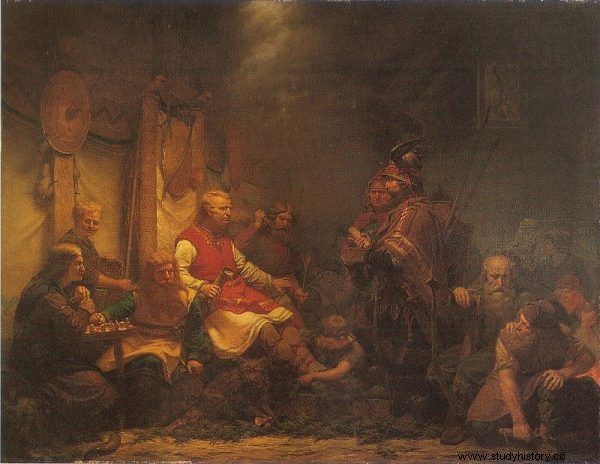
King Ella's messenger before the sons of Ragnar, the Hairy Pants. Image by August Malmstrom (source:public domain).
9. Boneless
Ragnar's son Ivar the Boneless he is already a completely historical figure. In the second half of the 9th century, at the head of a great army, he attacked England, conquered Northumbria and thus gave rise to regular Viking settlements in these areas.
Featured in the Annals of Ulster as "the king of all Scandinavians", he was to be worn on a shield by his warriors due to leg disease . One source even gives a more drastic, though unreal version - he thinks Ivar had no bones in his body at all!
Historians suspect that the nickname originated in some genetic disease, such as osteogenesis imperfecta.
The genetic mutation brought with it the nickname of Ivar's brother, Sigurd's Serpent's Eye . Sigurd, as brave as the rest of the Scandinavians, became famous for his brutal deal with the ruler of Northumbria, Ella. Together with his brother on the king's back, he "carved out a bloody eagle". In other words, he just gutted him.
Other Scandinavian rulers also distinguished themselves from their European colleagues with their original nicknames.
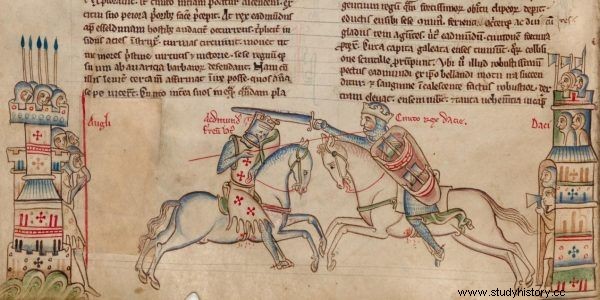
Canute the Great (on the right) during a duel with the English king Edmund II Żelaznoboki (source:public domain).
8. Blue tooth
Harald Blue tooth he is best known not as the man who introduced Christianity to Denmark, but as the patron of wireless communication technology. After all, Bluetooth is Blue-tooth. However, was his tooth or teeth really livid or dead ? ? Historians disagree.
There are theories that the nickname is derived from the color of the ruler's robes (bluish-blue), or from the pronunciation of his title in neighboring countries.
7. Hare's Foot
Harold and Harefeet , illegitimate son of Canute the Great, had an interesting nickname, although the ruler was uninteresting and did not repeat his father's successes. In truth, the English crown belonged to Harold's brother - Hardekanut, who, however, was in Denmark at the time of Papa's death in 1035.

The article was inspired by a series of novels by Maurice Druon entitled "The Cursed Kings" (Otwarte Publishing House 2016).
Harold's mother, Aelgif from Northampton, took advantage of the situation. By partially bribing and partially intimidating the barons, she made Harefeet regent of the kingdom of England .
Canute's legitimate spouse, Emma, wishing to remain in power, called for help from her sons, Edward and Alfred, who were then in Normandy. Harold dealt with competition quickly. Alfred was captured and blinded so brutally that he died, and Edward quickly returned to Normandy.
This article has more than one page. Please select another one below to continue reading.Attention! You are not on the first page of the article. If you want to read from the beginning click here.
Harold left this world at the age of twenty-four, possibly for natural reasons. The nickname of Hare's Foot came from his favorite pastime - he liked to hunt and he was good at it.
6. Helpless
Several decades earlier, the English crown was lost by Ethelred II the Helpless . The poorly ruled country was regularly plundered, and the inertia of the royal administration only encouraged the Vikings to attack bolder and bolder.
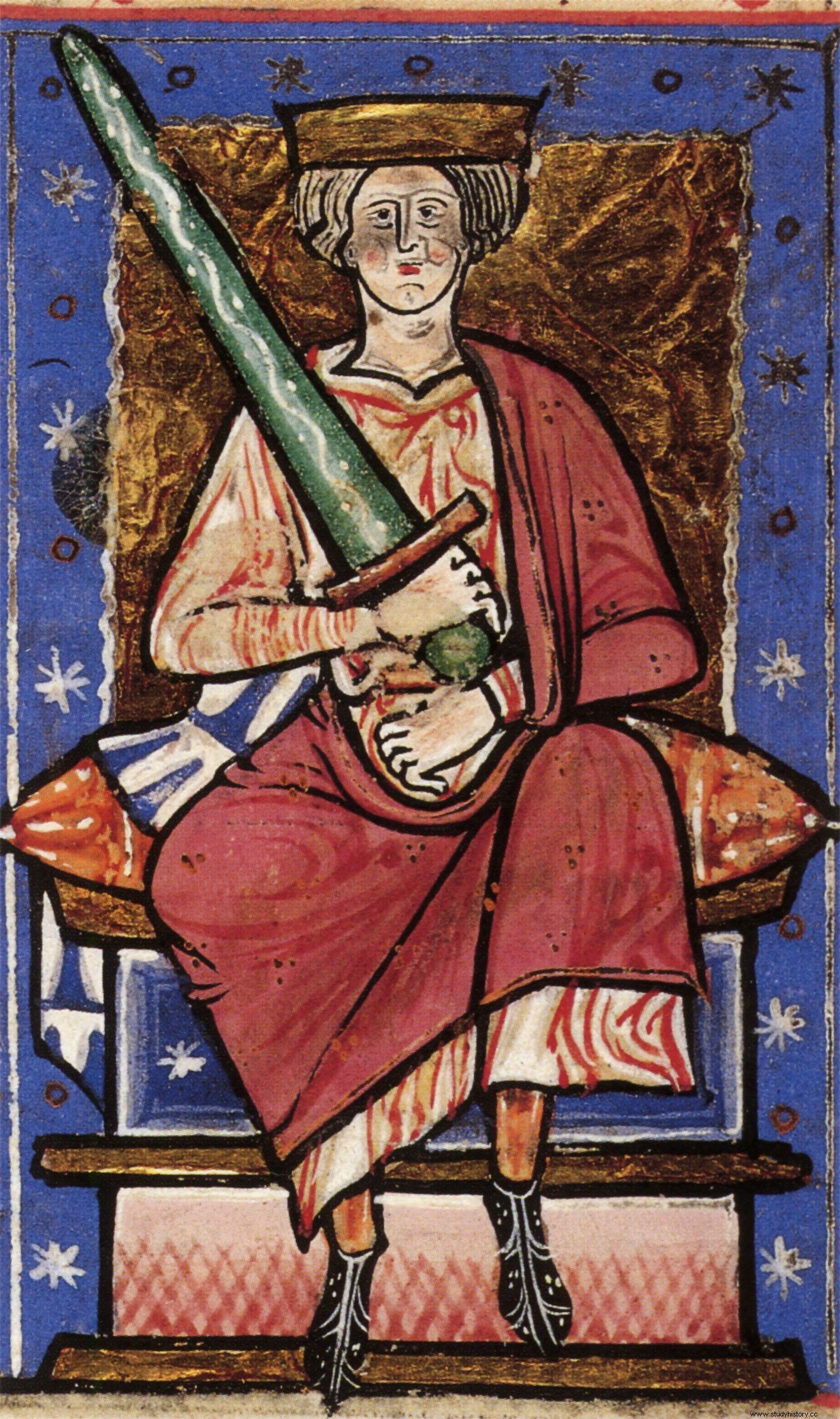
Ethelred II Helpless. His inept rule enabled the Danes to occupy England (source:public domain).
The humiliating ransom that Ethelred had to pay - 24,000 silver fines and twice as much in time - led to a desperate act by the ruler. By order of the king, on the day of St. Brittius, that is, on November 13, 1002, the English troops murdered the Danish settlers. Among the victims was Widłbeard's sister and her family.
This was the beginning of the end for Ethelred. The country, devastated by constant invasions and weakened by hunger, now began to be systematically conquered by the Danes. Betrayed by advisers and the English aristocracy, Ethelred II fled to Normandy . He regained the crown, but only for a short time, right after Swen's death.
Today, historiography tries to present him in slightly brighter colors, which does not change the fact that his rule is considered fatal - though not the worst in England's history. The worst Briton selected in a BBC poll was…
5. Soft sword
The youngest son of Henry II Plantagenet did not get any property from his father. Called from the earliest years John without Earth he grew up in the shadow of his older brothers, father and mother.
His stalks to the English Crown were long and are still covered by a black legend to this day. Pressing against brother Richard the Lionheart, oppressing his subjects, loss of all Plantagenet possessions in France, conflict with Pope Innocent III, empty treasury and war with English barons ... All this did not bring him shine and glory.
Due to the lack of victories, apart from the nickname without the Earth, he earned another one - Jan Soft Sword.

19th-century image of King John without an Earth signing the Great Charter of Freedoms (source:public domain).
The Great Charter of Liberty, which the king signed under the threat of civil war, although it became the basis of the constitutional system of England, in the time of King John was a symbol of the fall of royal power . No wonder that none of his successors took the risk and we did not live to see John II in the history of England or Great Britain.
Jan may have been the worst king in the history of England, but they are outdoing him in the competition for the worst nickname ...
4. Wonderful
This list must not miss a Polish accent. While the sources of the nicknames of Krzywousty, Łokietek or Laskonogi are known, the biography of Bolesław II Rogatka also known as Łysy, Srogy or Cudaczny, not entirely suitable for dissemination in school textbooks.
The grandson of Saint Jadwiga, the eldest son of Henry the Pious, did not resemble the respectable ancestors in any way .
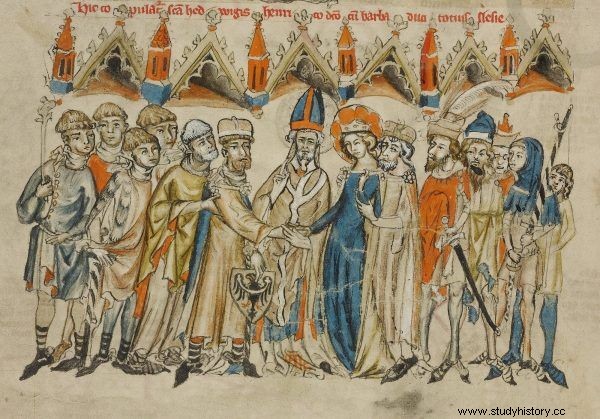
When St. Jadwiga got married to Henryk I the Bearded, she could not even suspect that their eldest grandson would turn out to be such a scumbag ... (source:public domain).
A mediocre politician, he was known for his entertaining lifestyle, audacity and impulsiveness. Already in the first years of his reign, he lost Krakow and Greater Poland, and then, as a result of a conflict with his younger brothers that lasted for years, he led to the fragmentation of Silesia.
The prince's confrontation with the bishop of Wrocław, Tomasz, and his imprisonment, echoed loudly. Only thanks to the quick mediation of the family did not end in the English style. A few years later, our hero kidnapped his nephew Henry IV Probus and thanks to this he regained some of the lands he had previously lost.
This article has more than one page. Please select another one below to continue reading.Attention! You are not on the first page of the article. If you want to read from the beginning click here.
As a lover of craftsmanship and chivalry culture, he organized the first tournament in Poland in Lwówek. He died of natural causes, according to Jan Długosz, driven by age and disease . Certainly, the chronicler contributed to the creation of the black legend of the Rogatka. The description of the duke's deeds leaves no doubt:
Husband of a violent mind (...) in lewd love affairs with a harlot entangled until death . (...) In everything crooked and in planting leather, usually without knowing the righteousness, especially in guttural matters, the judge was therefore called the Stern or Tornado, which in the Polish language means a bold man and a kind of horned man.
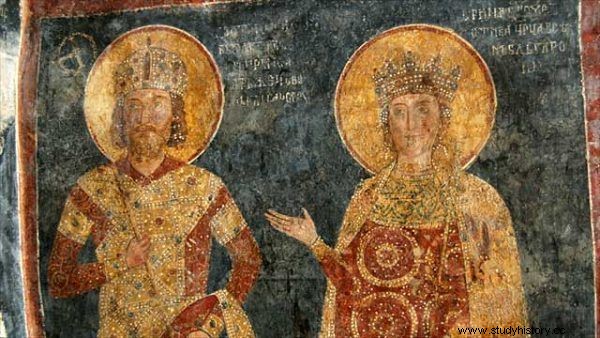
Konstantyn Tich did not even suspect that he would be succeeded by an ordinary swineherd ... On a fresco from the church in Bojana, the tsar depicted with his first wife Irena Laskarina (source:public domain).
3. Swineherd
Ivaylo Swineherd, also called Ivyel Cabbage, is a Bulgarian tsar who started his political career banally ... from farming, breeding pigs and organizing local self-defense . In the 1770s, Bulgaria was ravaged by the Tatar hordes. Paralyzed after falling from a horse, Tsar Constantine Tich gave up protecting the northern borders of the country. The population had to cope on their own.
Ivaylo quickly succeeded in organizing defense against the Tatars, and his popularity (supported by pious visions and communing with saints) eventually led to an armed conflict with the Tsar and his army.

The article was inspired by a series of novels by Maurice Druon entitled "The Cursed Kings" (Otwarte Publishing House 2016).
Constantine was killed in battle in 1277, and Ivaylo became involved in the Byzantine-backed civil war for the Bulgarian throne . A year later, after marrying the widow of Constantine, he became tsar. However, he did not enjoy the crown for long. Losing Byzantine support, he sought help at the court of Khan Nogaj and was murdered there in 1280.
2. Powerless
Henry IV Impotent also called Powerless. Lord of Castile and Leon, he married at the age of fifteen. Thirteen years later, he divorced in an atmosphere of scandal. His wife Blanka of Navarre remained a virgin , although Henryk's sexual prowess was supposed to be proved by the questioned local prostitutes.
In 1455 the king remarried. The chosen one, Joanna Portugalska, gave birth to three children, but that Henryk was more interested in his favorite than in his wife , several of the queen's lovers were suspected of paternity.
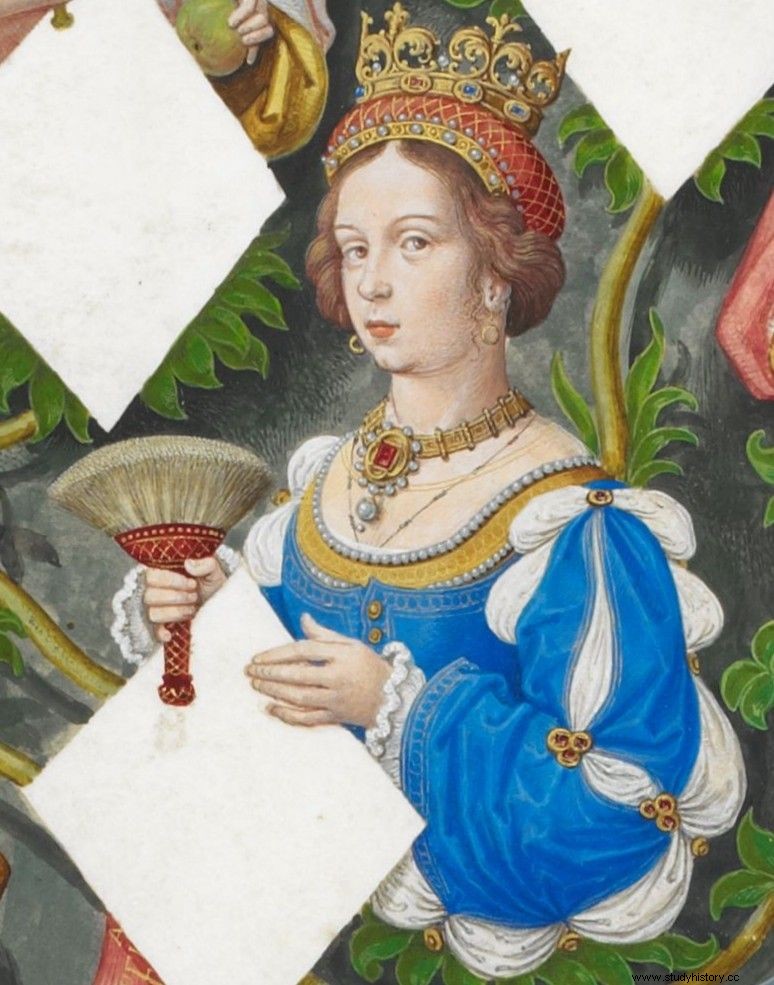
The wife of Henry IV Impotent, Joanna Portugalska, treated marital fidelity so lightly that she gave birth to three children ... (source:public domain).
Henryk was as intensely interested in the affairs of the state as he was in his wives. In the end, there was the so-called Avila farce - the dethronement of the king. Over the following years, until Henry's death in 1474, the country plunged into anarchy. Order and morality were restored by his sister Isabella, who was called Catholic.
1. Poop
Constantine V Copronim that is… My name is Kupa. Byzantine emperor reigning in the 8th century, an excellent, brilliant and talented leader. A good strategist and ruler. A lover of culture and art. If he had not sent the ruler of the Franks to Pepin the organs, who knows what the services in the churches of Western Europe would look like now.
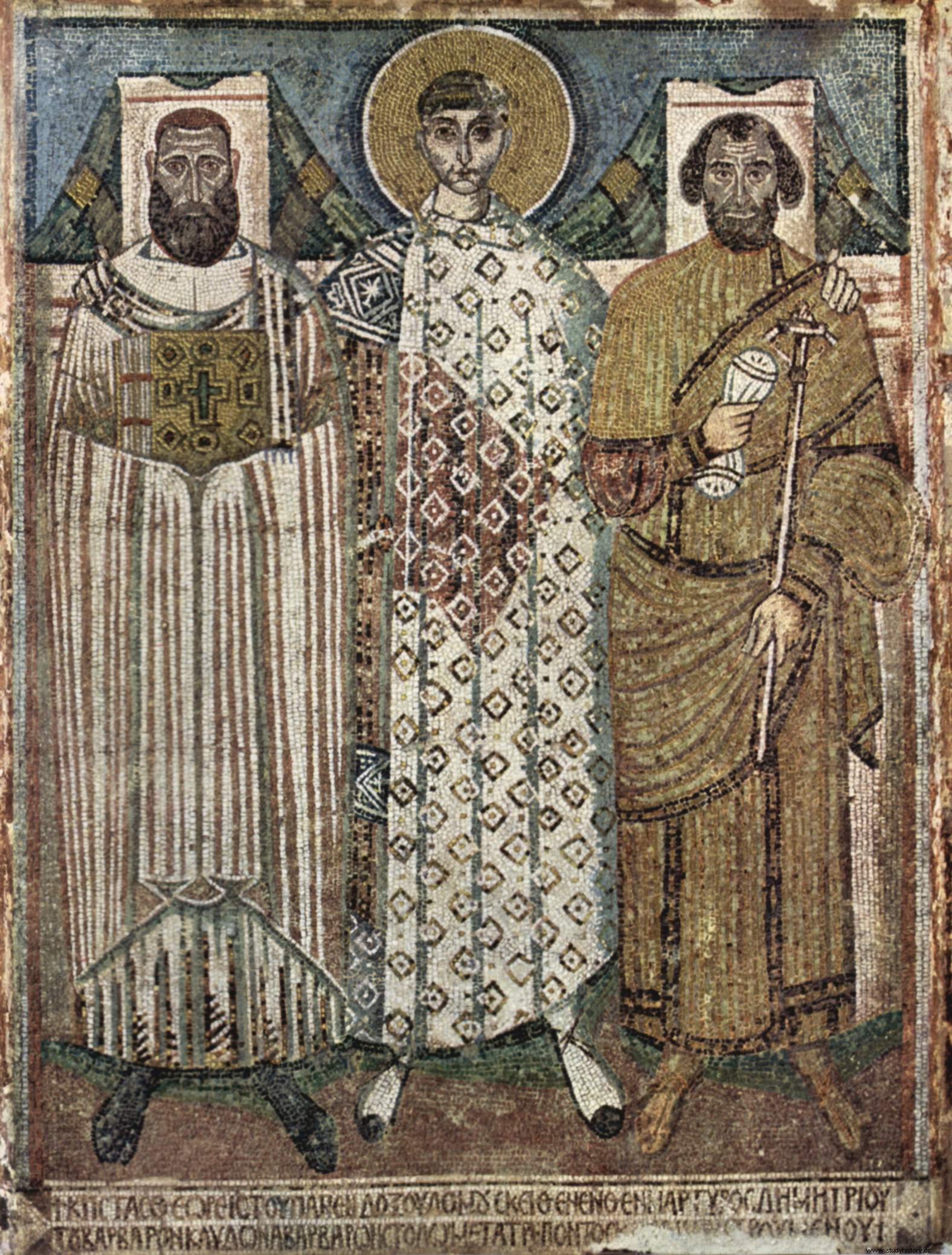
Mosaic of Dimitri from Thessaloniki. An example of Byzantine art from the turn of the 7th and 8th centuries (source:public domain).
Yet Byzantine historiography did not give him a fierce fight against the cult of icons . For his zealous burning of illustrated books, tearing out mosaics and devastating churches and monasteries, Theophanes the Confessor did not leave a dry thread on the emperor in his Chronicle. He portrayed him as a bloodthirsty beast and tyrant.
Rumor that Constantine contaminated the font with feces during his baptism , was enthusiastically received by opponents of iconoclasts. The hatred of the ruler caused his remains to be exhumed and thrown into the sea in the 9th century.
